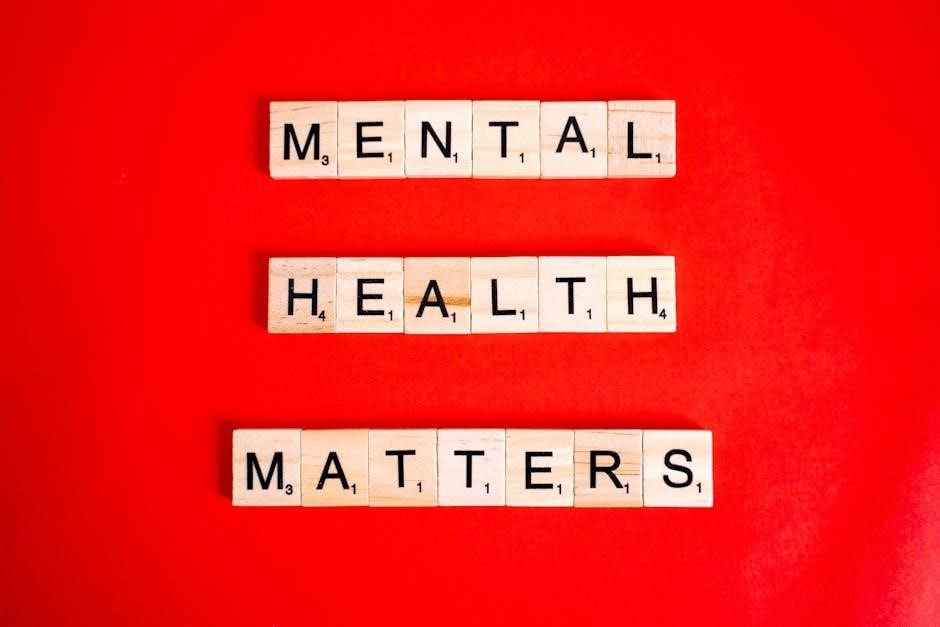
A mental health maintenance plan is a proactive approach to managing emotional well-being, emphasizing self-care and strategies to prevent relapse․ It helps individuals identify triggers, develop daily routines, and create crisis plans, ensuring a structured path to sustained mental health․
Importance of Mental Health Maintenance

Mental health maintenance is crucial for sustaining emotional stability and overall well-being․ It helps individuals identify triggers, manage stress, and develop coping strategies to prevent relapses․ By prioritizing self-care and proactive measures, people can enhance their resilience, improving daily functioning and relationships․ A well-structured maintenance plan fosters awareness of early warning signs, enabling timely interventions․ This approach not only promotes long-term mental health but also empowers individuals to take control of their well-being, reducing the risk of crises․ Regular maintenance ensures a balanced lifestyle, supporting physical and psychological health․ It is essential for building a strong foundation for navigating life’s challenges effectively․
Purpose of a Mental Health Maintenance Plan
The primary purpose of a mental health maintenance plan is to provide a tailored strategy for managing mental well-being․ It serves as a guide to identify triggers, develop daily routines, and outline actionable steps for maintaining emotional stability․ This plan helps individuals recognize early warning signs of distress, enabling them to implement coping mechanisms and seek support when needed․ It also includes a crisis plan to navigate challenging situations effectively․ By focusing on personalized self-care practices and proactive measures, the plan empowers individuals to sustain their mental health and improve their quality of life․ It acts as a comprehensive tool to enhance resilience, ensuring a structured approach to long-term wellness and emotional balance․
Key Components of a Mental Health Maintenance Plan
A mental health maintenance plan includes identifying triggers, recognizing early warning signs, establishing daily routines, and creating a crisis plan․ It also incorporates self-care activities and support systems․
Identifying Triggers and Early Warning Signs
Identifying triggers and early warning signs is crucial for maintaining mental health․ Triggers are events, situations, or emotions that can lead to relapse․ Common triggers include stress, relationship issues, or significant life changes․ Early warning signs might be subtle changes in behavior or mood, such as increased anxiety, irritability, or withdrawal from social activities․ Recognizing these signs allows individuals to take proactive steps to manage their mental health before a crisis occurs․ This section of the plan helps individuals list specific triggers and warning signs, enabling them to develop personalized strategies to mitigate their impact․ By being aware of these factors, individuals can better navigate challenges and maintain emotional stability․
Developing a Daily Maintenance Routine
A daily maintenance routine is essential for sustaining mental health․ It involves creating a structured schedule that incorporates activities promoting emotional and physical well-being․ Key components include self-care rituals, such as mindfulness or journaling, regular physical activity, and balanced nutrition․ Social connections should also be prioritized, as they play a vital role in emotional stability․ Additionally, adequate sleep and downtime are crucial for recharge․ The routine should be tailored to individual needs, ensuring it is realistic and adaptable․ Consistency is key, as it helps build resilience and reduces the risk of relapse․ By integrating these practices, individuals can create a foundation for long-term mental health management․ Regular review and adjustment of the routine ensure it remains effective and aligned with changing needs․
Creating a Crisis Plan
A crisis plan is a critical component of a mental health maintenance strategy, designed to provide guidance during periods of intense emotional distress․ It outlines specific steps to take when early warning signs of a crisis appear, ensuring quick and effective intervention․ The plan should include contact information for trusted individuals, such as family, friends, or mental health professionals, and list emergency resources like crisis hotlines․ Additionally, it should detail coping strategies and self-soothing techniques to manage overwhelming emotions․ A crisis plan may also specify advance directives, such as preferences for treatment or decision-making during a mental health emergency․ Having a well-defined plan in place can reduce feelings of helplessness and provide a sense of control, helping individuals navigate challenging situations more effectively․ Regular updates to the plan ensure it remains relevant and responsive to changing needs․

Daily Practices for Mental Health Maintenance
Daily practices, such as mindfulness, exercise, and balanced nutrition, are essential for maintaining mental well-being․ Consistency in these habits fosters emotional resilience and overall stability․
Self-Care Activities
Self-care activities are essential for maintaining mental well-being․ These practices, such as mindfulness, exercise, and balanced nutrition, help individuals manage stress and emotional challenges․ Consistency in these habits fosters emotional resilience and overall stability․
Examples include journaling, meditation, and engaging in hobbies that bring joy․ Prioritizing sleep hygiene, staying hydrated, and eating nutritious meals are also vital․ Organizing personal space can create a calming environment, reducing anxiety․ Regular self-care not only improves mental health but also enhances overall quality of life, making it a cornerstone of any mental health maintenance plan․
By incorporating these activities into daily routines, individuals can better navigate life’s challenges and maintain emotional balance․ Self-care is a personalized journey, and identifying what works best for each person is key to long-term mental health․
Building and Maintaining Social Connections
Building and maintaining social connections is crucial for mental health․ Strong relationships provide emotional support, reduce feelings of isolation, and foster a sense of belonging․ Regular communication with friends, family, or support groups helps individuals cope with challenges and prevents mental health decline․
- Scheduling regular social interactions ensures consistency in relationships․
- Engaging in community activities or group hobbies can expand social circles․
- Active listening and empathy strengthen bonds and create a supportive environment․
By nurturing these connections, individuals can build a network that aids in stress management and provides encouragement during difficult times․ Social connections are a vital component of a mental health maintenance plan, promoting overall well-being and resilience․
Physical Health and Its Impact on Mental Well-being
Physical health plays a significant role in mental well-being․ A healthy body supports a healthy mind, as physical activity, nutrition, and sleep directly influence emotional and mental states․ Regular exercise releases endorphins, which improve mood and reduce stress, while a balanced diet provides essential nutrients for brain function․
- Exercise helps reduce symptoms of anxiety and depression․
- Proper nutrition fuels the brain, enhancing cognitive function and emotional stability․
- Adequate sleep is crucial for mental restoration and emotional regulation․
Neglecting physical health can lead to mental health challenges, such as increased stress or low energy․ Prioritizing physical well-being fosters resilience and contributes to overall mental health maintenance, creating a balanced and thriving lifestyle․
Coping Strategies and Techniques
Coping strategies are essential for managing stress and emotional challenges․ Techniques like mindfulness, journaling, and grounding help build resilience, fostering mental well-being and emotional stability effectively․
Effective Coping Mechanisms
Effective coping mechanisms are personalized strategies that help manage stress, emotions, and challenges․ Identifying triggers and early warning signs allows individuals to implement tailored responses, enhancing resilience․ Self-care practices, such as journaling or creative activities, can alleviate emotional distress․ Building strong social connections provides emotional support, while mindfulness and relaxation techniques foster calm․ A structured plan, like the Wellness Recovery Action Plan (WRAP), offers a framework for maintaining mental well-being; By combining these strategies, individuals can navigate life’s challenges with greater ease and confidence, ensuring long-term emotional stability and overall mental health․
Stress Management Techniques
Effective stress management techniques are essential for maintaining mental well-being․ Practices such as mindfulness, deep breathing, and progressive muscle relaxation can help reduce tension․ Regular physical activity, like walking or yoga, also alleviates stress by releasing endorphins; Time management strategies, such as prioritizing tasks and setting realistic goals, can prevent overwhelm․ Engaging in hobbies or creative activities provides mental distraction and fosters calm․ Additionally, maintaining a healthy work-life balance and establishing boundaries is crucial․ Social support from friends, family, or support groups can also aid in managing stress․ Incorporating these techniques into a mental health maintenance plan ensures individuals are better equipped to handle life’s challenges proactively․
Mindfulness and Relaxation Practices
Mindfulness and relaxation practices are powerful tools for maintaining mental well-being․ These techniques help individuals stay present, reducing anxiety and stress․ Mindfulness involves focused attention on thoughts, feelings, and sensations without judgment, fostering self-awareness and emotional regulation․ Relaxation practices, such as deep breathing exercises, progressive muscle relaxation, and grounding techniques, promote physical and mental calm․

Regular mindfulness meditation can enhance resilience, improve mood, and reduce symptoms of anxiety and depression․ Incorporating activities like yoga or tai chi, which combine physical movement with mindfulness, can further support mental health․ By integrating these practices into a mental health maintenance plan, individuals can cultivate a sense of balance and better navigate life’s challenges․

Recognizing When Professional Help is Needed
Recognizing when professional help is needed involves identifying persistent emotional distress, worsening symptoms, or significant life challenges․ Seeking support early ensures effective intervention and improved mental well-being;
Understanding Early Warning Signs
Early warning signs are subtle indicators that mental health may be deteriorating․ These signs, such as mood changes, increased anxiety, or withdrawal from activities, signal potential relapse․ Identifying these cues helps individuals take proactive steps to address issues before they escalate․ Personalized plans often include lists of specific signs, allowing users to recognize when they may need additional support․ By monitoring these indicators, individuals can implement coping strategies or seek professional help early, preventing crises․ Understanding these signs is crucial for maintaining emotional stability and overall well-being․ Regular self-reflection and awareness of these signals empower individuals to take control of their mental health proactively․
Knowing When to Seek Support
Recognizing when to seek support is a critical component of maintaining mental health․ If early warning signs persist or worsen, such as overwhelming emotions, changes in sleep patterns, or difficulty functioning daily, it is essential to reach out for help․ Support can come from friends, family, or mental health professionals․ Knowing when to seek help is a sign of strength, as it allows individuals to address issues before they escalate․ Resources like crisis hotlines, such as 988, provide immediate assistance during emergencies․ A mental health maintenance plan should include clear guidelines on when and how to seek support, ensuring individuals feel empowered to take action․ Early intervention can prevent crises and promote long-term emotional well-being․